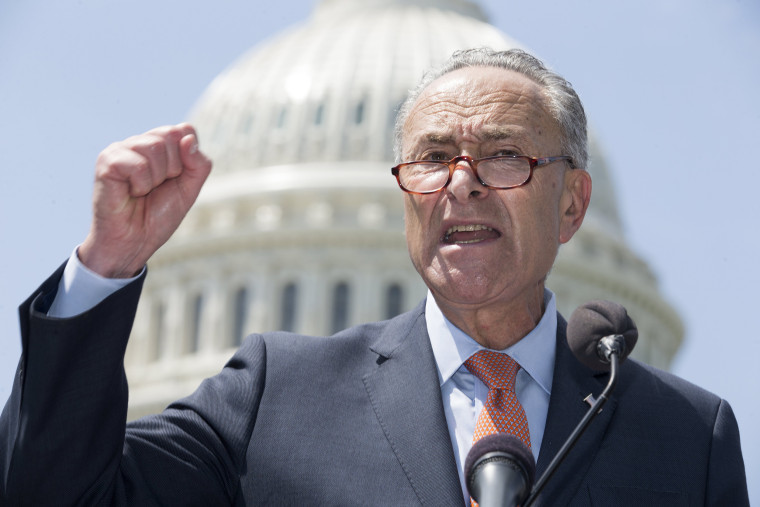WASHINGTON — President Donald Trump's sweeping new immigration-control plan has landed with a soft thud on Capitol Hill, where it threatens to divide Republicans.
Senate Majority Leader Mitch McConnell, R-Ky., didn't issue a statement on it. A spokesman for House Speaker Paul Ryan, R-Wis., said only that lawmakers would "review these principles" and consult with the administration. And several Republican lawmakers declined NBC News' requests for comment on the plan, which would increase detention and deportation of unaccompanied minors and undocumented workers, restrict legal immigration to the United States, and fund the construction of a border wall that Trump has long insisted would be paid for by Mexico.
The idea is to trade that White House wish list for the president's support of legislation that would protect from deportation a set of undocumented residents, known as Dreamers, who were brought to the United States illegally as children and are currently shielded by the expiring Deferred Action for Childhood Arrivals (DACA) program.
But many political insiders see the White House proposal as an opening bid that will ultimately be cast aside in favor of a deal that is more acceptable to Democrats and moderate Republicans.
In the meantime, it poses three problems for Republicans: There's no consensus within the GOP on many of the immigration-control provisions; the prospect of deporting Dreamers (which would happen if no agreement is struck) is unpalatable for some elected officials; and it's dangerous for lawmakers in politically tough districts and states to plant a stake anywhere when it's possible that the president will abandon his own plan.
"Depending on how it's done, there's great risk in it being divisive," said former California Rep. Mary Bono, a Republican who represented a Latino-influenced district where immigration is a hot-button issue. "Some members are a little bit afraid to take a position because they don't know where the leadership is. ... When the playbook keeps shifting, you're the only one left twisting in the wind at the end."
It's Trump who has given Republicans pause by veering all over the map on immigration.
He ran as a hard-liner, promised to build the wall at Mexico's expense and said he would end DACA — which he sees as an unconstitutional exertion of executive power by President Barack Obama — upon taking office. But he didn't rescind the DACA program immediately, and didn't follow through on a threat to shut down the government absent funding for the wall.
In a move that infuriated his base, Trump appeared to reach a deal in principle over the summer with top Democrats to protect DACA recipients. But then he veered away from that accord by announcing a March 2018 end to the program in an attempt to force Congress to act legislatively. And, on Sunday night, in the midst of a holiday weekend, the White House announced the new proposal, which many Republicans believe is a reflection of the most anti-immigration impulses of senior White House policy adviser Stephen Miller.
It's little wonder that some Republicans are feeling whiplash — and a bit concerned about the plan's power to divide them while uniting Democrats in opposition.
"This is a case where the silence speaks volumes because the reality is there are aspects of the proposal, such as cuts to legal immigration, that don't have support from a majority of Republicans, let alone the 60 votes needed to pass it in the Senate," said Brian J. Walsh, co-founder of the public affairs firm Rokk Solutions and a former Senate GOP leadership aide.

Senate Minority Leader Chuck Schumer, D-N.Y., and House Minority Leader Nancy Pelosi, D-Calif., issued a joint statement criticizing the plan on Sunday night. "This proposal fails to represent any attempt at compromise," they said, noting that they were open to "reasonable border security measures."
But several Republicans who spoke to NBC News expressed confidence that Trump and Democrats could find common ground.
"If ever there was room for a deal, it's on DACA," said former Virginia Rep. Tom Davis, who called it a "no brainer" for Democrats to offer some money for the wall to protect Dreamers. "You’ll see a deal at the end of the day. But they’ve got to go through the dance first."
Lanhee Chen, the David and Diane Steffy Research Fellow at the Hoover Institution and the top policy aide on Mitt Romney's 2012 presidential campaign, called the Trump plan an "opening bid." He added that the White House needs to do a better job of defining "the core thing that the president will not do a deal without" in order to drive an agreement on immigration.
Bono said Trump's experience in the business world should help him reconcile the impulses of immigration hard-liners with the needs of U.S. companies that want foreign workers.
"He, of all presidents, should understand that," she said. "I believe that at the end of the day, he's going to recognize how important this is to him and the businesses he's been successful at."
The key on the Republican side, Davis said, is for Trump to give cover for any concessions made from the original plan.
"If Trump puts his blessing on this thing, I think it takes off all the pressure," he said.

